What Surprised Me about Working with African Lions
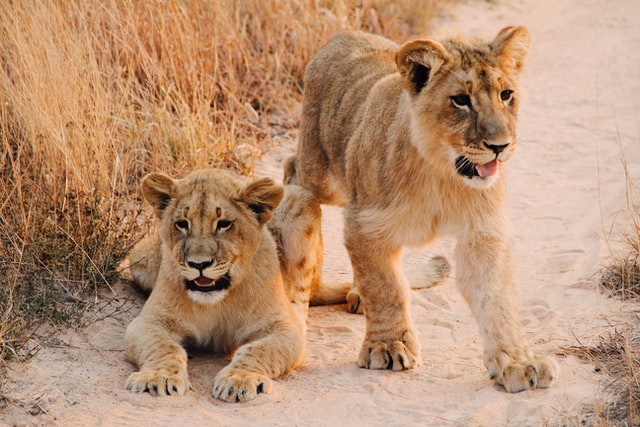
When you think of Africa, your thoughts usually sculpt images of the vast golden savanna teeming with huge herds of wildebeest, elephants bathing in the waterhole, cheetahs giving chase to leaping impala, giraffes foraging at the top of the acacia trees, and zebras braying in the background. But no African scene is complete without the iconic African lion. And how could it not be? Just the mere sight of a lion is awe-inspiring.
The regal males sport their magnificent manes, their heart quickening roars, and the endearing strength of a lion pride. This “king of the jungle” has been used as an important symbol in several different cultures throughout history to represent aspects such as royalty, strength and courage. All in all it is not hard to see how the lion has stolen the hearts of so many. And I am most definitely one of them.
From as far back as I can remember I have loved lions and when asked what I wanted to do when I grew up, my answer was always to work with lions. Friends and family humored me for a while but never believed it an actual possibility. Acquaintances inquiring of my future goals would say, “oh how oddly specific” or would look at me like I had three heads. But the jokes on them, because in 2014 I was accepted into an internship with the African Lion Environmental Research Trust (ALERT) and was lucky enough to spend a summer in Zimbabwe working with, you will never guess what, LIONS! And now, they look at me like I have 6 heads.
Through these experiences I was able to learn more about lions than I thought possible.
As an intern for ALERT, I was able to assist with the raising of two cubs, walk with lions daily in the bush, help to conduct behavioral research on a lion pride and even contribute to lion conservation. Through these experiences I was able to learn more about lions than I thought possible. Before I got there, I thought I had lions all figured out. I mean, come on I was the “lion girl.”
But lions have a way of keeping you on your toes, and to truly embrace the phrase, “expect the unexpected”. I spent that incredible summer pleasantly surprised by it all. Here are four things that surprised me working with these amazing animals.
What Surprised Me about Working with African Lions
1.Sometimes Loving Something Is Keeping Your Distance.
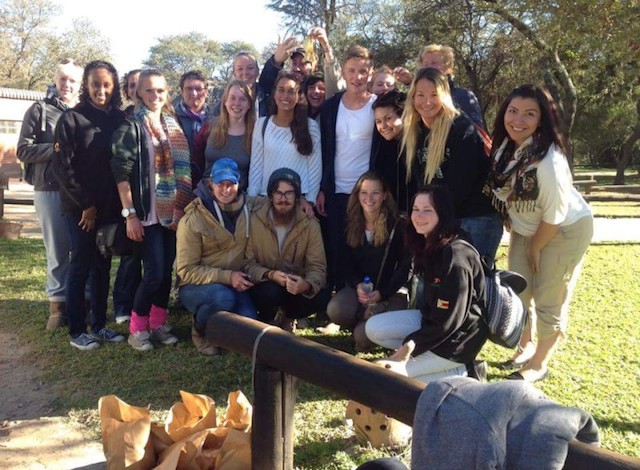
I admit my original intention was never to view lions from a safe distance. I wanted a hands-on, intimate relationship with them. You know the lion whisperer? He’s that guy you see in those videos being hugged by huge adult male lions or wrestling with a number of rambunctious lionesses. I wanted that experience more than I care to admit and I am sure I am not alone in that. This is not to say that I don’t recognize that lions aren’t domesticated animals. They are wild animals and I know that. But I also know that the lion isn’t doing so hot as a wild animal.
Unfortunately it is not common knowledge, but the African lion population has hit an all-time low. They no longer inhabit most of their historic range in Africa, with the last of the wild populations surviving in only Central and West Africa. This brings about a sort of dilemma in terms of the dream I was chasing. That close relationship with lions that I had daydreamed about does nothing to address the problem that they are facing as a species. In some respects, it totally contradicts conservation efforts.
Sure, I enjoyed working with the cubs and walking with the sub adults. But ALERT first and foremost is a conservation program and all work done with the lions is essentially pre-release training.
In this way I have always been torn between my selfish desire work hands on with lions and the call to fight for their survival as a species. My summer with ALERT changed this. Sure, I enjoyed working with the cubs and walking with the sub adults. But ALERT first and foremost is a conservation program and all work done with the lions is essentially pre-release training.
While these human raised lions don’t go directly into the wild, the idea of the program is that captive-bred lions are released into a semi-wild environment, free of human contact, as a self-sustaining pride. This wild-living pride then gives birth to cubs that are raised in their natural environment, the same as wild-born lion. As such, when old enough, they can be reintroduced into appropriate national parks and reserves, as done in ALERT’s release program.
Needless to say, I am no longer torn in terms of my future goals. I am fully committed to the conservation of the entire species, not just the interests of a few individuals.
So yes, working with the cubs and walking the subadults was great, but every moment spent working with them was a moment spent getting them more acclimated to their natural environment. And in doing so, these moments were spent distancing us from them and them from us.
When looking at my pictures, people often comment on how cool it is to be so close to a lion. This is often all people care to see and part of what I saw before I got there. Sure, it was hard to distance myself from these lions that I had come to know, especially with the cubs I helped raise. But they say if you love something you have to set it free and after working with ALERT I found nothing to be more true.
Needless to say, I am no longer torn in terms of my future goals. I am fully committed to the conservation of the entire species, not just the interests of a few individuals.
2.Hunting is No Piece of Cake
Of all the ways I was able to work with lions, the most thrilling would have to be walking with lions in the bush. This took place every morning and every evening with one of two pairs of the young females. As unique of an experience as it was for those of us out there walking shoulder to shoulder with lions, it was not without purpose. These lion walks serve as a way to expose cubs to prey species so they can hone their hunting skills, all while within the safety of their surrogate pride (us).
Through these repeated opportunities to practice hunting, these young lions eventually become successful at catching prey such as impala, wildebeest, and the oh so delicious zebra. This sounds simple enough, right? But walking with these lions everyday, it became clear that learning to hunt isn’t just a flick of the switch. It is in fact quite the process.
What Surprised Me about Working with African Lions
It’s hard to imagine the mighty “King of the Beasts” as an ungainly cub running scared from a zebra with an attitude. But alas it’s all part of the process which I was lucky enough to witness. I usually walked a pair of lions by the names of Sikumi and Kariba that were just over a year old at the time. Sikumi was definitely more into hunting than Kariba and almost every time we came upon a prey species Sikumi would go into stalking mode, crouch to the ground and inch ever closer to the prey.
I was also able to see the end result of all these walks from observing successful kills with the older more practiced lions. All in all hunting, is no piece of cake. Or piece of zebra. Either way, watching these lions learn to hunt in the face of so many failures makes me glad that my ability to procure a meal doesn’t depend on my skill in remaining incognito until the precise moment, or my level of coordination. If so, I would have starved out years ago. I’m not even entirely confident in my ability of sneak up on a slice of pizza, never mind an impala.
3.Lazy is an Understatement.
Before arriving I knew I was going to be dealing with a somewhat lazy animal. Lions are said to spend most of their time resting, sometimes up to 20 hours a day, so I was prepared for that. Or, so I thought.
Lions are in fact the laziest animals I have ever encountered, and I have met some incredibly fat, inactive house cats. As part of my internship, I assisted the research technician with collecting behavioral data on the released pride in stage two of the program. Every day, we would go into the research site multiple times and observe the pride for about two hours. Often times though, while collecting data we observed the pride doing what lions do best: sleeping.
Not that it was boring. Even if they didn’t move the entire research session, they were often times curled up in impossibly cute cuddle puddles. Even despite the cuddle puddles there was plenty of data to collect, so boredom was not really the problem.
Like most young animals, lion cubs develop much of their skills for adulthood through play.
But I am one of those people that always have to be doing something so working with an animal with an almost inconceivable ability to do so little for so long was hard to get used to. This was especially true of the cubs I helped to raise.
Like most young animals, lion cubs develop much of their skills for adulthood through play. So part of our job was to facilitate play and of course it was just as fun for us as it was for them, but it never lasted long. I would often get really into it and then all of a sudden I was playing by myself. It was like a tragic preschool flashback. It was never long after we fed them that these little balls of temporary terror were out like a light.
After a while, I began to pick up what the cubs were doing. In other words, they taught me that I could in fact enjoy lounging about and kicking back. And come to find out, some days it pays to be able to lounge like a lion.
4. I Am Nowhere Close To The Only One.
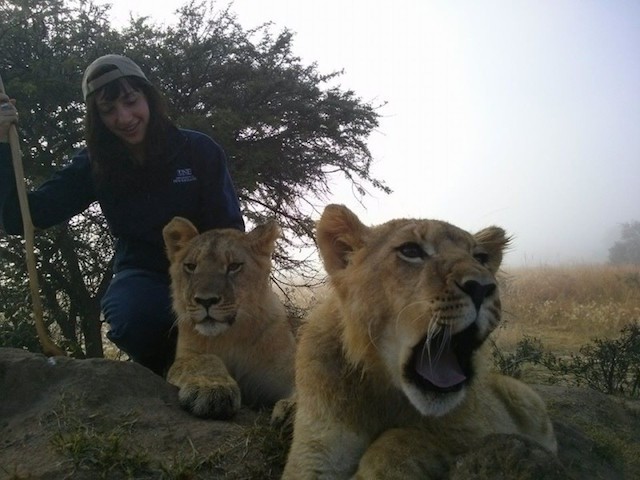
I could go on and on about my experience this past summer. Yes, I really could. Just ask any of the poor innocent people who were unaware of my ability to unload an entire summer of stories before they could even fathom an escape route. But in the end I was only there for three short months, and I was just one of a whole host of people at ALERT working towards the conservation of African lions.
ALERT and Antelope Park are home to the most incredible staff and host to interns and volunteers from all over the world who all share the same passion that I thought I was alone in. I cannot begin to express my gratitude to and admiration of all the people at ALERT that have devoted their efforts and in many cases their lives to helping the African lion.
It has helped restore some of my faith in humanity to say the least and for once it was nice not to be the weird lion girl. I was just the weird girl but hey you win some you lose some.
What Surprised Me about Working with African Lions
I learned that the African lion has more support than I originally thought. But even with all these people at ALERT and the many other organizations working so hard to make a difference for this species, it is not enough of a difference. The true conservation of any species requires a global effort, and the more people that jump on board the more of a difference we can make.
I couldn’t agree more with ALERT’s motto, Africa does need lions, but more importantly African lions need organizations like ALERT and people like you and me to support efforts to ensure their survival.
Follow your dreams. I know, I know I sound like every corny self-help guru out there, but seriously follow your dreams wherever they take you. Even if that’s all the way to Zimbabwe.
So at the end of the day I guess I can say that I was a little more than just pleasantly surprised by my summer with ALERT. I know what most of you are thinking. Oh great here it comes, more sentimental crap. Well good guess, because there is most definitely more. But I would have to say that out of all the ways I was surprised this past summer, I was most surprised at how easy it was to chase an “impossible” dream. So if you take anything away from this (besides the all-important “save the lions” message) take this:
Follow your dreams. I know, I know I sound like every corny self-help guru out there, but seriously follow your dreams wherever they take you. Even if that’s all the way to Zimbabwe. No, especially if that’s all the way to Zimbabwe, or where ever the origin of your dream. Or the destination of it. Whichever way you slice it, just find it, make it happen, and don’t hesitate. If it’s anything like my experience you won’t be disappointed. Oh and don’t forget, we need African lions!
What Surprised Me about Working with African Lions
Related Reading
5 Tips for Planning Your African Safari
Have you worked with African lions? Email us at [email protected] for information about sharing your experience and advice with the Pink Pangea community. We can’t wait to hear from you.
What Surprised Me about Working with African Lions photo credits: Liz B and Unsplash.

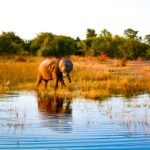

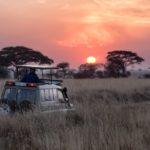


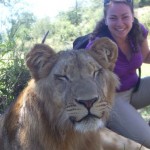

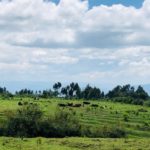
Liz
That was beautifully written! Keep following your dream.
John ( your parents friend)